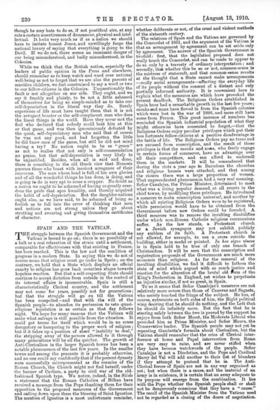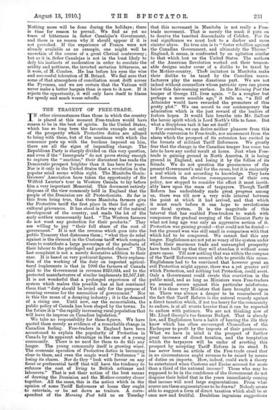SPAIN AND THE VATICAN.
Talstruggle between the Spanish Government and the atican is bound to go on; there is no possibility of a halt or a real relaxation of the strain until a settlement, comparable for effectiveness with that existing in France, has been reached. This is the law and the condition of progress in a modern State. In saying this we do not of course mean that religion must go under in Spain ; on the contrary, we hold that a State which displays an official enmity to religion has gone back countless stages towards hopeless reaction. But that a self-respecting State should continue to accept dictation from outside in the control of its internal affairs is inconceivable. Spain is still a characteristically Clerical country, and the settlement may not come for years, possibly not for generations ; but that the struggle will go on till the Vatican has been compelled—and that with the will of the Spanish people—to abandon its pretension to veto quasi- religious legislation is as certain as that day follows night. We hope for many reasons that the Vatican will make what salvage is still possible from the situation. It could get terms for itself which would be in no sense derogatory or hampering to the proper work of religion ; but if it takes up a position of sheer "inability to deal," the stripping away of the powers allowed to it through many generations will be all the quicker. The growth of Anti-Clericalism in the larger Spanish towns has been a notable phenomenon of the last few years. In the smaller towns and among the peasants it is probably otherwise, and no one could say confidently that if the present dynasty were successfully misrepresented as the enemies of the Roman Church, the Church might not find herself, under the banner of Carlism, a party to civil war of the old- fashioned Spanish type. We notice, indeed, in the Sack a statement that the Roman Catholics of Bilbao have received a message from the Pope thanking them for their opposition to the proposed measures of the Government and calling down upon them the blessing of Saint Ignatius. The mention of Ignatius is a most unfortunate reminder, whether deliberate or not, of the cruel and violent methods of the sixteenth century. The relations of Spain and the Vatican are governed by the Concordat of 18,51, and the argument of the Vatican is that an arrangement by agreement can be set aside only -by agreement. The answer of the Spanish Government is twofold : first, that the legislation proposed does not really touch the Concordat, and can be made to appear to do so only by a travesty of ordinary interpretation ; and secondly, that whether this be so or not, common-sense is the mistress of statecraft, and that common-sense revolts at the thought that a State cannot make arrangements —really social arrangements—affecting the everyday life of its people without the consent of a distant and only partially informed authority. It is convenient here to explain what the measures are which have provoked the present deadlock. The Religious Orders established in Spain have had a, remarkable growth in the last few years ; monks and nuns have flowed in from the Spanish colonies which were lost in the war of 1898, and more still have come from France. This great increase of numbers has reminded the Spanish industrial population of what they might otherwise have consented to forget,—that the Religious Orders enjoy peculiar privileges which put their less fortunate fellow-citizens at a positive disadvantage in the battle of life. The Religious Orders pay no taxes and are excused from conscription, and the result of these privileges is that the monks and nuns, who freely engage in certain forms of commerce, have an advantage over all their competitors, and ean afford to undersell them in the markets. It will be remembered that during the riots a year ago in Barcelona the churches and religious houses were attacked, and that among the rioters there was a large proportion of women. That unprecedented phenomenon had a very real meaning. Senor Canalejas, the Prime Minister, determined to meet what was a rising popular demand, at all events in the chief towns, by modifying these privileges. He introduced a measure to make conscription universal, and another by which all existing Religious Orders were to be registered, while permission would have to be obtained from the Government before new Orders could be founded. A third measure was to remove the insulting disabilities under which non-Roman Catholie religious communions suffer. As the law stands, a Protestant church or s, Jewish synagogue may not exhibit publicly any emblem of its faith. A Protestant church is not allowed, for example, to use a cross outside the building, either in model or painted. In hoc signo vinees is in Spain held to be true of only one branch of Christendom. It will be seen that the conscription and registration proposals of the Government are much more economic than religious. As for the removal of the insulting disabilities, we find it difficult to fathom the state of mind which argued with so muchjustice and emotion for the alteration of the brutal old Berm of the King's Declaration in England, yet wishes to perpetuate an injustice similar, if not so great, in Spain. To us it seems that Seiler Canalejas's measures are not relatively more severe than those of Car:Lovas and Sagasta, who merely touched the fringe of the subject. He has, of course, extremists on both sides of him, the Right political wing desiring that he should do nothing, and the Left that he should do infinitely more. But the fact that he is steering safely between the two is proved by the support he enjoys from both Senor Moret, the Moderate Liberal who preceded him as Prime Minister, and Senor Maws, the Conservative leader. The Spanish people may not yet be repeating Gambetta's formula about Clericalism, but the Vatican should remember that the cries of Clerical inter- ference at home and Papal intervention from Rome are very easy to raise, and are never stifled when they have become watchwords of the people. Se:icor Canalejas is not a Diocletian, and the Pope and Cardinal Merry del Val will add another to their list of blunders if they attempt to pretend that he is. The Anti- Clerical forces of Spain are not in any way organised as yet; but when there is a cause, and the material of an army is in existence, it is certain that an army adequate to its purpose will emerge from the combination. It lies with the Pope whether the Spanish people shall or shall not be dangerously conscious that they have a "cause." The recall of the Spanish Minister from the Vatican need not be regarded as a closing of the doors of negotiation. Nothing more will be done during the holidays ; there is time for reason to prevail. We find as yet no trace of bitterness in Seiior Canalejas's Government, • and there is no reason why it should appear if it is not provoked. If the experience of France were not • already available as an example, one might well be . uncertain of the course of a great Clerical controversy ; but as it is, Senor Canalejas is not in the least likely to defy his instincts of moderation in order to emulate the aridity and pettiness, the inverted sectarian bitterness, as it were, of M. Combos. He has before his eyes the wise and successful toleration of M. Briand. We feel sure that • some of that atmosphere of conciliation must drift across the Pyrenees, and we are certain that the Vatican will never make a better bargain than is open to it now. If it rejects the opportunity, it will only have itself to blame for speedy and much worse rebuffs.







































 Previous page
Previous page